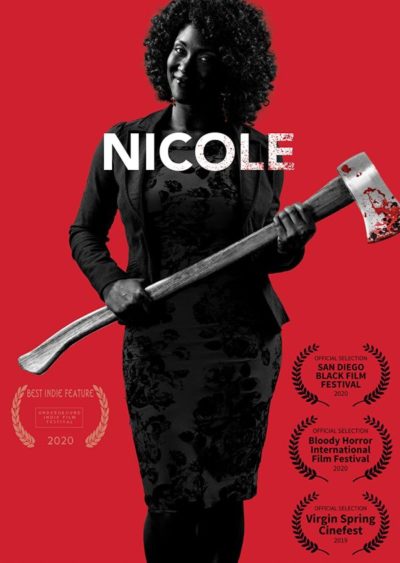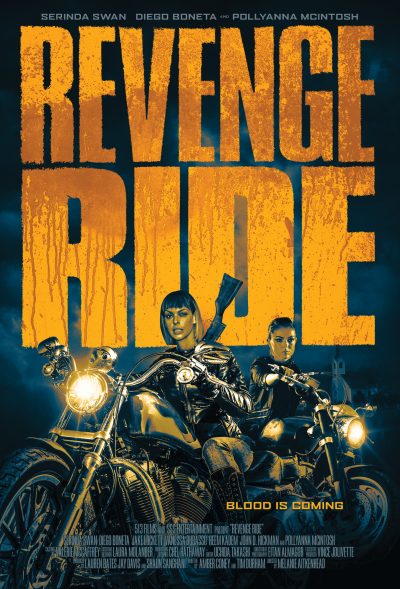★★
“In need of repossession.”
 This is one of those cases where you can see what a film is trying to do. It just isn’t very good at doing it. In this case, the central character is Gina (Killips), who works as a collector of debts for the mysterious and reclusive “Max”. This is for reasons that become clear towards the end – yet, like a lot else in the film, it doesn’t actually prove to be of much significance. Her latest job involves locating a very large sum of money which went missing from his organization. Suspicion falls on Myles (Orille), and Gina is tasked with finding out whether he was indeed responsible and if so, what he did with the loot. To this end, Gina inserts herself into Myles’s life and comes under increasing pressure from her boss, Simon (Rumley), to get results for Max. But Gina is increasingly disenchanted with her profession, and also increasingly convinced of Myles’s innocence.
This is one of those cases where you can see what a film is trying to do. It just isn’t very good at doing it. In this case, the central character is Gina (Killips), who works as a collector of debts for the mysterious and reclusive “Max”. This is for reasons that become clear towards the end – yet, like a lot else in the film, it doesn’t actually prove to be of much significance. Her latest job involves locating a very large sum of money which went missing from his organization. Suspicion falls on Myles (Orille), and Gina is tasked with finding out whether he was indeed responsible and if so, what he did with the loot. To this end, Gina inserts herself into Myles’s life and comes under increasing pressure from her boss, Simon (Rumley), to get results for Max. But Gina is increasingly disenchanted with her profession, and also increasingly convinced of Myles’s innocence.
What this is aiming at, is depicting a “realistic” portrayal of an enforcer like Gina. This means meaningless chit-chat about whether Gina will or will not be able to make it to a neighbourhood barbecue. Guess what? We. Just. Don’t Care. It’s the kind of thing which could have been put over by a better film-maker in a couple of shots, without the need for characters actually to have a conversation about it. Still, this is what you expect from a man making his first feature, and also choosing not only to direct, but also write and edit the thing as well. Oh, yeah: while also acting as location manager and stunt co-ordinator. That’s spreading yourself perilously thin. Of all those areas, I’d say the editing comes off best, assembled together things in a way that’s coherent and does the most with what Fairman the director has given Fairman the editor.
The rest? Well… not so much. The fights are unimpressive at best, in particular a woeful one where Gina faces a drunk guy behind a bar. This, being the opening demonstration of her talents, should have established her bad-ass credentials. It looks like the result of five minutes of preparation, and even if nothing else is quite as poor, you only get one chance to make a first impression. On the location front, I was amused by the way the fights were very careful staged to avoid property damage; you’d think they could at least have brought their own coffee-table to go through. The script, as noted, tries to do too much, especially at the end, where it attempts a double-twist, but doesn’t stick the landing. The main positive is, I think, Killips. She hits the appropriately world-weary note for the character of Gina, and manages to handle even the chattier scenes in a way which kept them just interesting enough.
Credit is also due to Fairman for getting out there and actually making a feature, especially one with a strong heroine. Hopefully, next time, he’ll get the help he needs to deliver a more polished product.
Dir: Dave Fairman
Star: Ashley Killips, A.J. Orille, Phil Rumley, Eric Hergott





 It’s probably significant that the opening credits of the film talk about the bands and the whiskey company involved. Any mention of the actual actresses taking part, is relegated to a secondary sequence, 15 minutes into the film. That seems to indicate where the priorities lie: if you told me the whole thing was made up to get freebies and as a showcase for the director’s mates, I’d have no problem believing you. Another warning sign is the way every post-production visual trick you can imagine is thrown in there; this often indicates an attempt to paper over flaws in other areas. There’s no doubt the film is certainly trying. However, Bizarro simply tries far too hard, and it’s not long before it becomes simply trying on the viewer instead.
It’s probably significant that the opening credits of the film talk about the bands and the whiskey company involved. Any mention of the actual actresses taking part, is relegated to a secondary sequence, 15 minutes into the film. That seems to indicate where the priorities lie: if you told me the whole thing was made up to get freebies and as a showcase for the director’s mates, I’d have no problem believing you. Another warning sign is the way every post-production visual trick you can imagine is thrown in there; this often indicates an attempt to paper over flaws in other areas. There’s no doubt the film is certainly trying. However, Bizarro simply tries far too hard, and it’s not long before it becomes simply trying on the viewer instead. The setting is a dystopian version of London, which has become separated into two distinct halves, and classes of residents. It’s a world in which cybernetic enhancements are common. But they come at the cost of a debt – sometimes, virtual enslavement – to the powerful corporations who supply and maintain them. Frankie has resisted these, preferring to retain her humanity, and journeys into the dangerous undercity, to help those less fortunate. But on one such trip, she’s shot and left for dead. Rescued by the renegade Doctor Xenox, she wakes to find herself in a new, artificial and highly-powered body. She’s not too happy about it. Things get worse, for the doctor’s erstwhile corporate employers, Psytech, consider Frankie v2.0 as their property, and will stop at nothing to get her under control. As a result, with the help of the Doctor, and cop Gibson, she has to fend off the assembled forces of Psytech.
The setting is a dystopian version of London, which has become separated into two distinct halves, and classes of residents. It’s a world in which cybernetic enhancements are common. But they come at the cost of a debt – sometimes, virtual enslavement – to the powerful corporations who supply and maintain them. Frankie has resisted these, preferring to retain her humanity, and journeys into the dangerous undercity, to help those less fortunate. But on one such trip, she’s shot and left for dead. Rescued by the renegade Doctor Xenox, she wakes to find herself in a new, artificial and highly-powered body. She’s not too happy about it. Things get worse, for the doctor’s erstwhile corporate employers, Psytech, consider Frankie v2.0 as their property, and will stop at nothing to get her under control. As a result, with the help of the Doctor, and cop Gibson, she has to fend off the assembled forces of Psytech. No-one does low-budget hyperviolence like the Japanese. Whether it’s pseudo-snuff like Guinea Pig: Flower of Flesh and Blood, or more fantastical entries such as
No-one does low-budget hyperviolence like the Japanese. Whether it’s pseudo-snuff like Guinea Pig: Flower of Flesh and Blood, or more fantastical entries such as  If you came into this with absolutely no previous knowledge (including the poster on the right!), you’d be forgiven if you spent the first forty minutes thinking this was an independent drama about the perils of professional dating life in the big city. Then, suddenly, it’s
If you came into this with absolutely no previous knowledge (including the poster on the right!), you’d be forgiven if you spent the first forty minutes thinking this was an independent drama about the perils of professional dating life in the big city. Then, suddenly, it’s 
 Mary (Dubasso) is drugged and raped by three members of the football team at a college party. Believing neither the college authorities nor the police will do anything, she turns to cousin Maggie (Swan) for help, because her relative is a member of the all-female Dark Moon motorcycle gang (eloquent slogan: “Eat my pussy”). Run by Trygga (McIntosh), they take revenge on the rapists, branding their catchphrase on the perpetrator’s asses, and leaving them in full view on the college campus. The fraternity boys don’t take this kindly, and strike back, causing things to escalate towards an all-out war. Complicating matters are Maggie’s increasing feelings for Brian (Boneta), one of the team, though uninvolved in the rape.
Mary (Dubasso) is drugged and raped by three members of the football team at a college party. Believing neither the college authorities nor the police will do anything, she turns to cousin Maggie (Swan) for help, because her relative is a member of the all-female Dark Moon motorcycle gang (eloquent slogan: “Eat my pussy”). Run by Trygga (McIntosh), they take revenge on the rapists, branding their catchphrase on the perpetrator’s asses, and leaving them in full view on the college campus. The fraternity boys don’t take this kindly, and strike back, causing things to escalate towards an all-out war. Complicating matters are Maggie’s increasing feelings for Brian (Boneta), one of the team, though uninvolved in the rape. Halle Berry was born the same year I was. There is, however, just one of us that is capable of convincingly playing the role of a mixed martial artist. To give you another yardstick, the lead in this was originally going to go to Mrs. Ryan Reynolds, Blake Lively (
Halle Berry was born the same year I was. There is, however, just one of us that is capable of convincingly playing the role of a mixed martial artist. To give you another yardstick, the lead in this was originally going to go to Mrs. Ryan Reynolds, Blake Lively (
